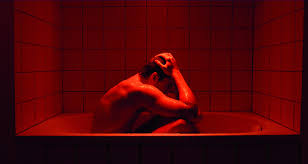Gaspar Noé once appeared in one of his films as an extra masturbating in the background of a gay club. Noé did this, he explains, as the scene in the club was bound to stir up criticism from the gay community, and if he himself were to appear in the scene, aroused, no such complaints of homophobia could be levelled against him.
It’s no surprise then, that Noé’s latest sexual misadventure is so completely out of touch with its own prerogative. Love is a 3D romantic drama doubling as an art-house porn film. We follow Murphy, a helplessly selfish American film student in Paris, and his tumultuous relationships which arise out of a threesome with his girlfriend, Electra (Aomi Muyock) and their new neighbour, Omi (Klara Kristin). A pregnancy follows, and Murphy is plunged into a world where it’s impossible for him to get what he wants and all he is left to do is to pick up the pieces.
These relationships are explored through their intense, sexual nature. Love is full of unrelenting and explicit sex, brought to unending life by the wonders of 3D. Noé is clearly trying to provoke and shock with such explicit and three-dimensional sexuality, but also reveal an unseen passion in terms of relationships in cinema. The sex scenes are incessant and literally in your face, in an attempt to reveal without censure the realities of love and sexual relationships. It’s a shame that such an upfront and unabashed depiction of sexuality can so quickly become tiresome and boring, becoming exactly what it sets out to destruct.
Explicit sex, can and has been done well in cinema, in ways which challenge the way we view sex on screen, pushing us to the edge of what we’re comfortable with. 2013 film Blue Is the Warmest Colour, which happens to share a producer with Love, does so excellently. Through long, impassioned sex scenes, we gain further insight into the intensity and realities of the relationship. The scenes in Blue is the Warmest Colour are long, explicit and frequent, yet they are never overdone and it’s for that reason that their power is never lost.
But in Love, the sex scenes become so excruciatingly tiresome that their effect is almost entirely lost. They come one after another, each more explicit and longer than the last. It’s important to understand that the issue is not with the uncensored and lengthy nature of these scenes. It’s that in trying to shock us with this sexual imagery, or perhaps even normalise its presence on the screen, Noé ultimately bores us beyond belief. It’s as if no one actually edited Love. It feels immeasurably long, and you can’t help but feel that too much time is spent dwelling on the least interesting parts of Murphy’s relationships with Electra and Omi.
This is not to say that there is no sense of real passion and emotion in these characters. Beneath the tiresome, unconsidered barrage of sex, are hints of good performances from the cast, and perhaps even a decent film to be had in the screenplay, had it been executed better. The dialogue is, at times, hard to swallow and it’s far too easy to wince when Murphy talks about anything with his smug, ignorant pompousness, but that’s kind of the point of his character. You have to feel sorry for Glusman and the cast who must have felt they were getting on board a project that seemed daring, but that in the editing room has ended up as nothing more than an indulgent romp. Had there been more restraint in the editing process, perhaps we might have ended up with something entirely more entertaining, and Noé might have actually achieved what he set out to do.







